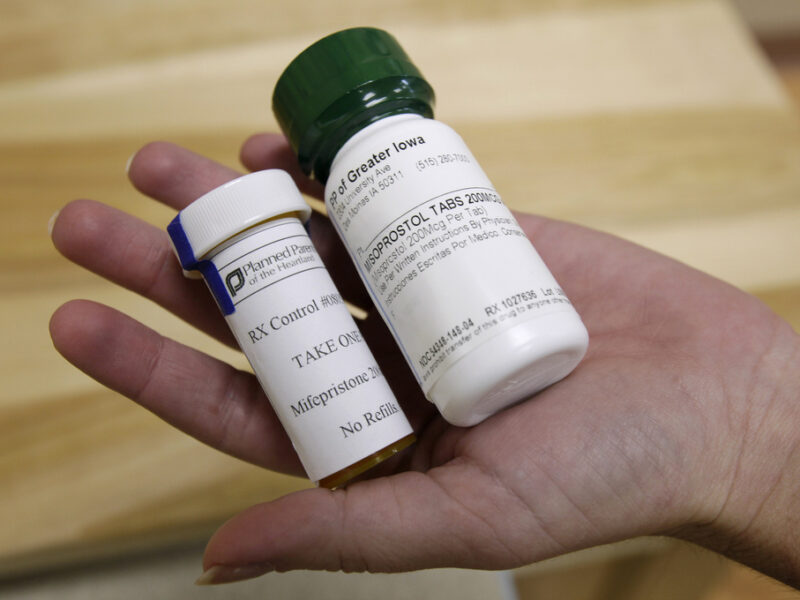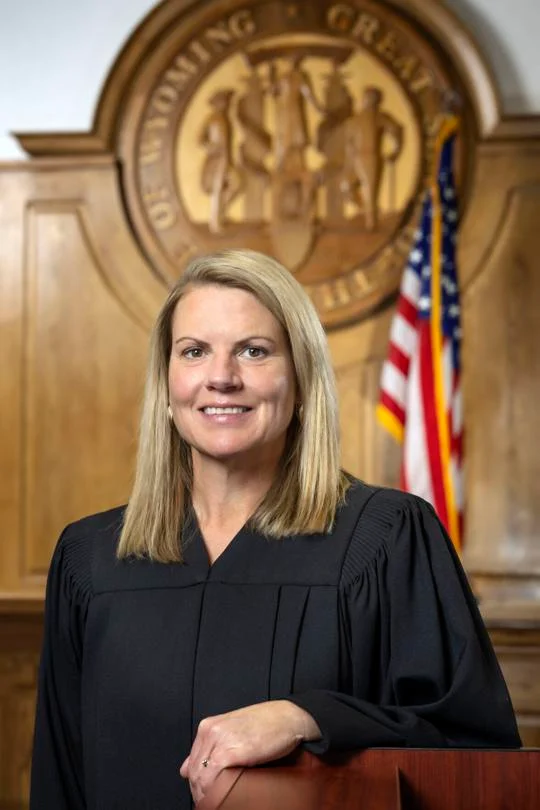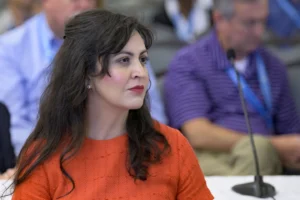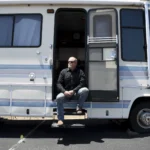Wyoming Judge to Rule on Legality of State’s Abortion Bans
Plaintiffs argue the laws will have a ‘devastating impact on women's health’
- Published In: Politics
- Last Updated: Dec 15, 2023

A Wyoming judge will soon decide whether the state's two abortion bans, including a first-in-the-nation prohibition on medical abortions, should be allowed to stand. (AP Photo/Charlie Neibergall, File)
By Jacob Gardenswartz
Special to the Wyoming Truth
A Wyoming judge will soon determine the fate of abortion access for women in the Equality State, in a case that could have implications for such procedures in Wyoming and throughout the nation.
Teton County District Court Judge Melissa Owens must decide whether to strike down, uphold or hold a trial over two Wyoming laws restricting abortion: H.B. 152, the “Life is a Human Right Act,” which criminalizes most abortion procedures with minimal exceptions; and S.F. 109, the first state law to explicitly ban abortions via medication.
Over nearly four hours of oral arguments on Thursday, Owens heard from attorneys on both sides of the dispute: representing the plaintiffs — four Wyoming women, including two obstetricians and two abortion-supporting nonprofit organizations — were attorneys Peter Modlin, John Robinson and Marci Bramlet.
Representing defendants Gov. Mark Gordon and Attorney General Bridget Hill — the officials charged with enforcing the bans — was Special Assistant Attorney General Jay Jerde.
The hearing was lengthy and complex, as attorneys debated factual and legal questions concerning the constitutional provisions allegedly violated by the laws, the technicalities of the plaintiffs’ challenges and the types of scrutiny tests under which the judge must consider them.
The arguments came as the parties have already filed hundreds of pages of legal briefs on these topics.
“We have, frankly, buried you with paper,” conceded Modlin in his opening remarks.

Thursday’s hearing marked the latest development in what has amounted to a multi-pronged effort by Republicans in the statehouse to ban abortions, something which began even before Roe v. Wade was overturned last year. Already, Owens has sided with those seeking to nullify the bans three times: issuing a temporary injunction against the state’s so-called “trigger” law in July of 2022, extending that injunction a month later and again blocking the bans from taking effect earlier this year.
Owens gave no indication as to how she might rule, though she reserved the majority of her questions for Jerde. Concluding the hearing, she thanked both parties for “wonderful presentations,” and noted that due to the “hours of the oral argument and the complex, constitutional issues before this court,” she would take the matter under advisement.
Separately, the Wyoming Supreme Court is weighing a matter tangential to the case: whether two Republican state lawmakers and an anti-abortion advocacy group can intervene in the case. If approved, the lawsuits could be delayed further, forcing the parties to “restart this case from the beginning,” Modlin argued during a hearing on Tuesday.
Regardless of Owens’ decision, all parties concede the matter is likely to be appealed to the state Supreme Court. But for now, while Owens deliberates, abortions remain legal in Wyoming up to the point of viability.
Plaintiffs urge not to lose sight of ‘real people’
During their portion of arguments, the plaintiffs’ attorneys urged the judge not to lose sight of what they say the case is really about: “Statutes that would have a profound effect on real people,” per Modlin.
His testimony sought to illustrate how each of the state’s arguments in favor of the abortion bans is flawed.
To the state’s claim that the bans protect women, Modlin questioned “from what,” noting abortions have been found to be far safer than pregnancy or delivery. He argued that forcing women to carry pregnancies to term can have detrimental impacts on their mental states, suggesting the bans will have a “devastating impact on women’s health in the state.”
To the state’s claim that the bans protect fetuses, Modlin highlighted how the exceptions to the laws do allow abortions in certain cases, a tacit acknowledgement that not all fetuses will be protected. He also argued forcing women to deliver fetuses with birth defects could cause them tremendous pain: “The fetuses after birth, are going to suffer greatly,” he said.
To the state’s claim that the bans protect doctors, Modlin noted Wyoming state law already ensures doctors cannot be forced to provide an abortion if they don’t want to. Moreover, he argued the exceptions to the bans are unconstitutionally vague, putting physicians in a difficult position of determining whether they believe a pregnancy issue is significant enough to meet the qualifications required.
Robinson used the majority of his time to lay out the constitutional case for overturning the bans, suggesting the Wyoming Constitution goes further than the U.S.’s founding document to provide its citizens rights to privacy and health care.
Bramlet, the only woman attorney in the hearing, was most personal in her arguments.
“I am the beneficiary of decades, if not centuries, of advocacy by women, in order to create an equal position in society that allows women to do exactly what I do right now,” she stated.
Alleging the bans violate the state constitution’s equal protections clause, she concluded by arguing they amount to “nothing short of a direct assault on women’s equal rights and equal participation in society.”
Defendants argue courts should not make policy
In his defense, Jerde offered less of a factual rebuttal to the plaintiffs’ claims than a legal one.
“This is a court of law, not a court of policy,” he began, suggesting the plaintiffs’ concerns with the bans would be better taken up through legislative or political means, not judicial ones.
“The vast majority of the arguments that the plaintiffs have made here today…are policy arguments about why they disagree with the statutes,” Jerde argued. “We are here to decide whether or not, as a matter of law, they are unconstitutional.”
As in previous hearings, Jerde honed in on whether the choice to have an abortion qualifies as a health care decision, a right granted to Wyomingites in Art. 1, Sec. 38 of the state constitution.
“If a pregnant woman is getting an abortion and it’s not related to her health, it just isn’t health care,” he said. “If you’re not getting the abortion to address pain, it’s not being done for health care purposes.”
Pressed by the judge about why mental health was explicitly prohibited as an exception in the chemical abortion statute, Jerde dodged.
“Somebody should’ve put those statistics [on mental health] before the legislature if they thought they were significant,” he said.
To plaintiffs’ claims that the exceptions provided are unconstitutionally vague, Jerde argued that so long as one doctor could reasonably interpret them, they should be allowed to stand: “You only have to have one circumstance where the physician would understand that the exception clearly applied and then it’s constitutional.”
Jerde closed by suggesting that if the plaintiffs don’t like the laws, “their recourse is to get the statutes changed or to get the constitution changed.”
Asked by Owens on how they might pursue a change to the Wyoming Constitution, Jerde conceded: “It’s really not my role to advise on that.”
Despite the heavy topics up for debate, there was time for a moment of humor. Towards the start of the hearing, Owens asked attorneys to briefly pause their arguments as she “just remembered something I need to do.”
“Don’t worry, it was related to this case,” she followed up quickly. “It’s not a grocery list or anything.”













